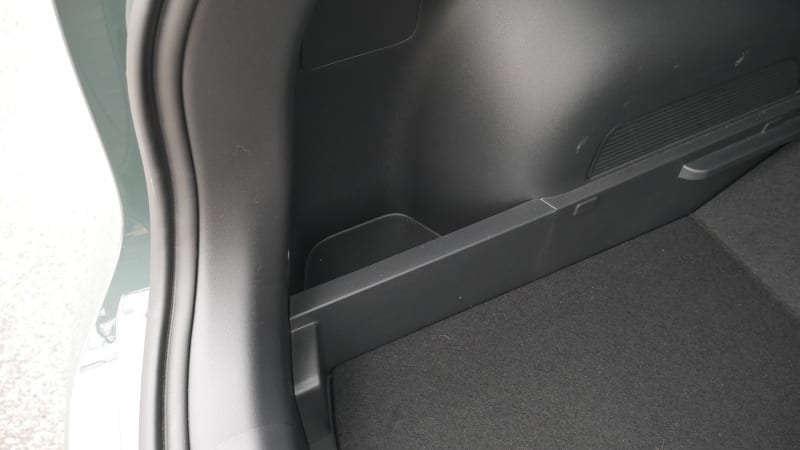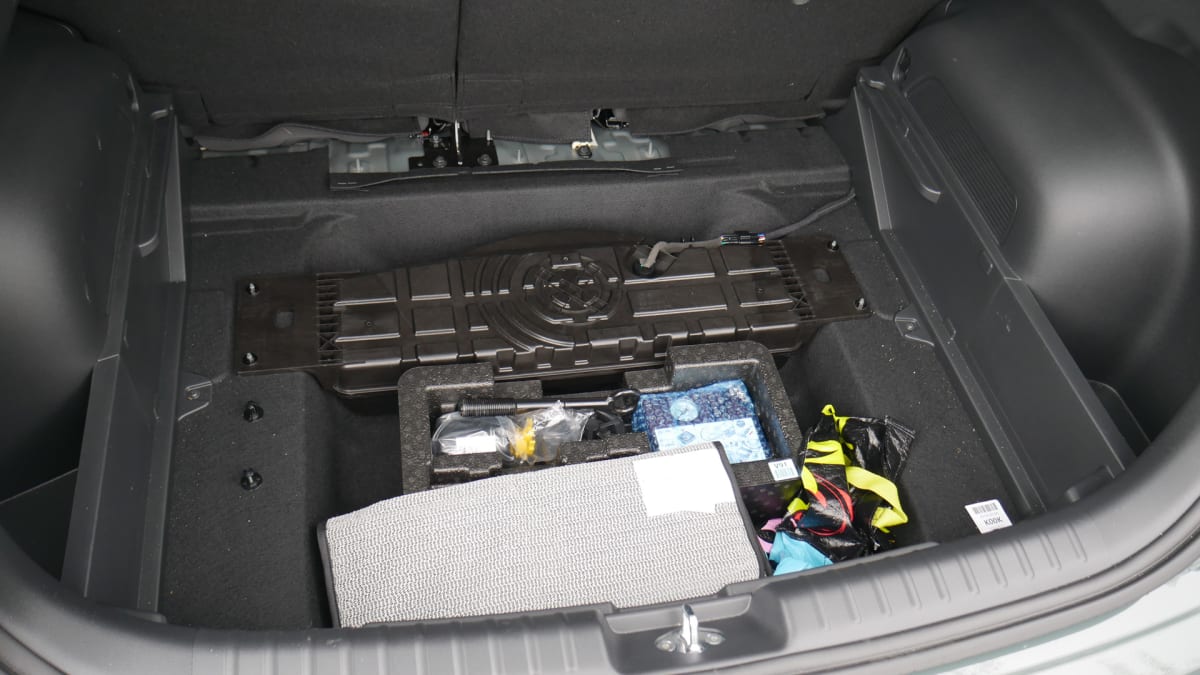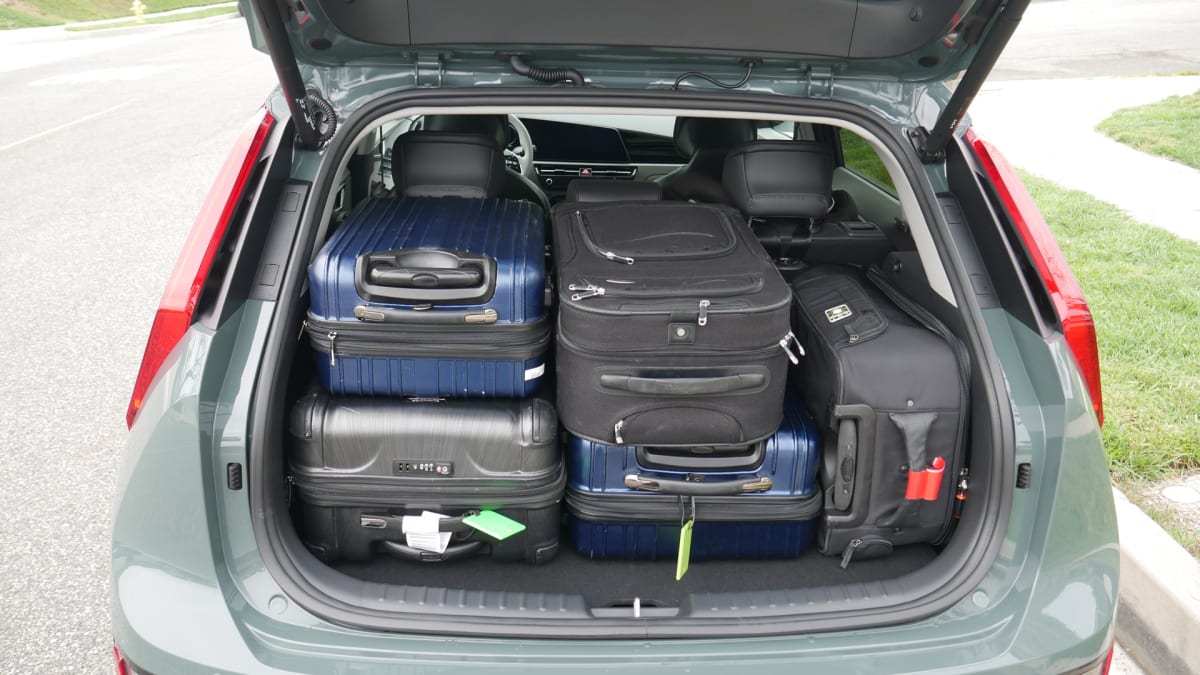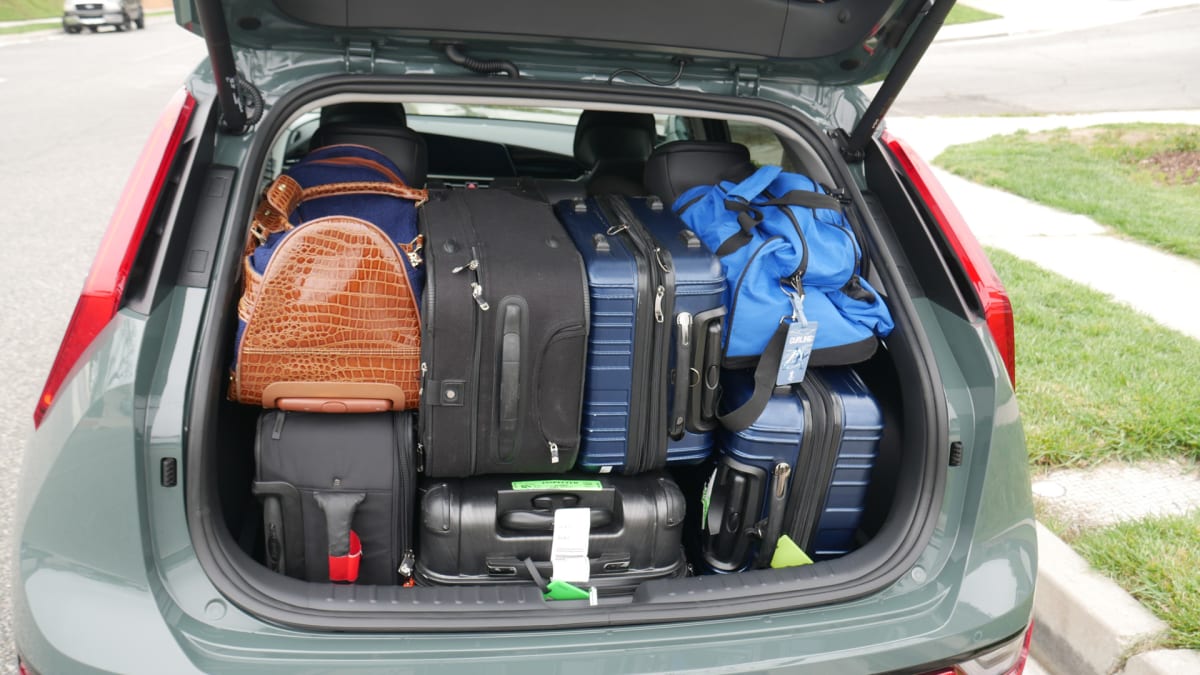Last week, the new Toyota Prius was brought into Luggage Test HQ and didn’t exactly leave a winner. This week, we have one of its only competitors: the Kia Niro. Sure, the body style is totally different, but the number of hybrids and plug-in hybrids in this price and general size range are limited, so this is what we’ve got. And while I may mention the Prius again once or twice throughout, the Niro quite simply wipes the floor with it in terms of cargo capacity.
The Niro grew enough for its second generation that it now aligns closely with the group of SUVs we dubbed “midcompact” because they slotted in between subcompact and compact models. Its official cargo capacity figure of 22.8 cubic-feet would put it on the low end of that subsegment, but as you’re about to see, it does much better with actual stuff. There is a caveat, however.
You see, the Niro is available with regular hybrid, plug-in hybrid and full electric powertrains. The hybrid and EV include a dual-level cargo floor, as many small SUVs do, to allow for maximum capacity with the rear seats raised or a flat load-floor with them lowered. The plug-in hybrid only has the higher floor height, however, because the combination of bigger battery and gas tank effectively wipes out the extra cargo depth. The result is an official capacity of 19.4 cubic-feet, which confirms that Kia is indeed counting the lower floor height with its other cargo measurement.
Thankfully, however, as the difference between them all in terms of cargo space is the dual-level load floor, I could just test with both floor heights and tell you exactly how much each version of the Niro can hold despite only testing the EV. And not only any Niro EV — this is literally my own car.

On the left is the upper height, or the only way the Niro PHEV looks.
On the right is the lower height. You can see that it’s not a fully flat space, with a ramp of sorts at the rearmost section. I thought this would be an issue, but as it turns out, it’s basically mitigated by the angle of the seatback — you can’t put suitcases flush against it anyway. It would look like this < from the side.


Here is a closer look at the depth, plus some storage on either side. Unfortunately, those gutters aren’t removable to effectively widen the lower floor area.

Here’s what’s under the floor. No Niro comes with a spare tire.
OK, let’s get to the bags. As in every luggage test I do, that means two midsize roller suitcases that would need to be checked in at the airport (26 inches long, 16 wide, 11 deep), two roll-aboard suitcases that just barely fit in the overhead (24L x 15W x 10D), and one smaller roll-aboard that fits easily (23L x 15W x 10D). I also include my wife’s fancy overnight bag just to spruce things up a bit (21L x 12W x 12D).

This would be the capacity with the high floor and therefore maximum capacity for the Niro PHEV. All of my bags, minus the fancy bag.
Ah, but there’s totally that space in the upper right!

Yeah, but it’s not big enough for the fancy bag. Something would obviously fit there, but not that.
This is actually pretty similar to the last-generation Subaru Crosstrek (20.8 cu-ft on paper), which could only fit the fancy bag in this exact same location by the skin of its outdoorsy teeth.
This amount of stuff is greater than the Prius (and Prius Prime plug-in hybrid) as well as the Jeep Compass, first-generation Hyundai Kona and Chevrolet Trailblazer.
OK, now let’s lower the floor and show you maximum capacity for the Niro hybrid and Niro EV.

Big difference. All the bags fit with enough room to spare for that blue duffle bag. It admittedly took some Tetrising to get here, but you’ll note there’s plenty of space to the roof / remaining visibility.
These are actually the exact items I was able to fit in the Kia EV6, and more than I could fit in the Hyundai Ioniq 5 with its sliding seat fully rearward. Those might have more room on paper, but both have more raked tailgate/roof lines that hamper loading and result in a lot of useless space. The Niro is better off for being more hatchbacky.
The Volkswagen ID.4 has just a bit more space (basically the difference of a briefcase).

One more note. This makes it look like the back seat reclines, but it does not. That plastic cleat is also obviously intended for a cargo cover of some sort with additional points located on the liftgate to bring up the cover when the liftgate is open. My Niro doesn’t have this cover. Neither did the various press cars I’ve tested, nor is a cargo cover listed as an available accessory on Kia’s build your own function. I’ll be keeping an eye open for it in the future.
Speaking of owning this car, this is the first time I’ve actually loaded it up with luggage. I have filled it with beach gear, though: four camp chairs, a basket full of sand castle toys, towels, beach ball, soft-sided cooler and a beach wagon to haul it all. No problem.
I should also say that I hadn’t raised the floor from the low height since I lowered it after taking possession of the car back in December. Indeed, one of the reasons we opted for the EV rather than the PHEV was the extra cargo space, and I can now say that it does in fact make a difference. The other reason? The EV is two seconds quicker from 0-to-60. Turns out I care about more than just cargo capacity! How ’bout that?!?
